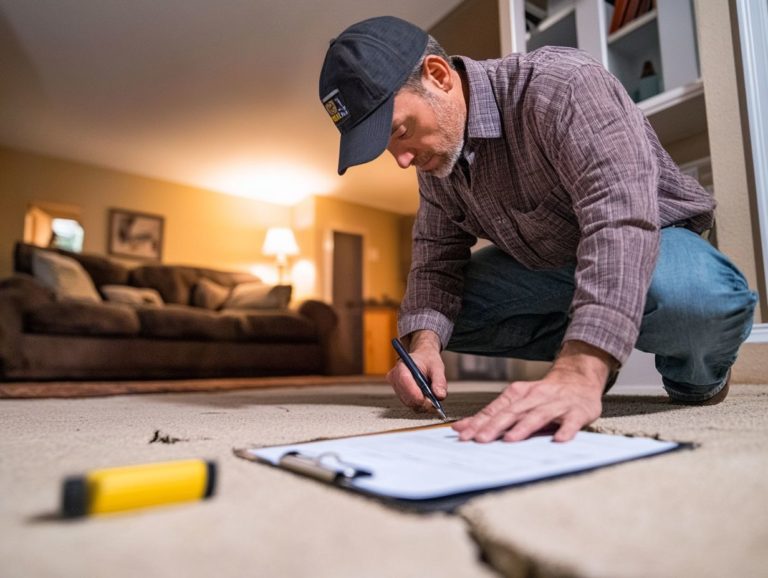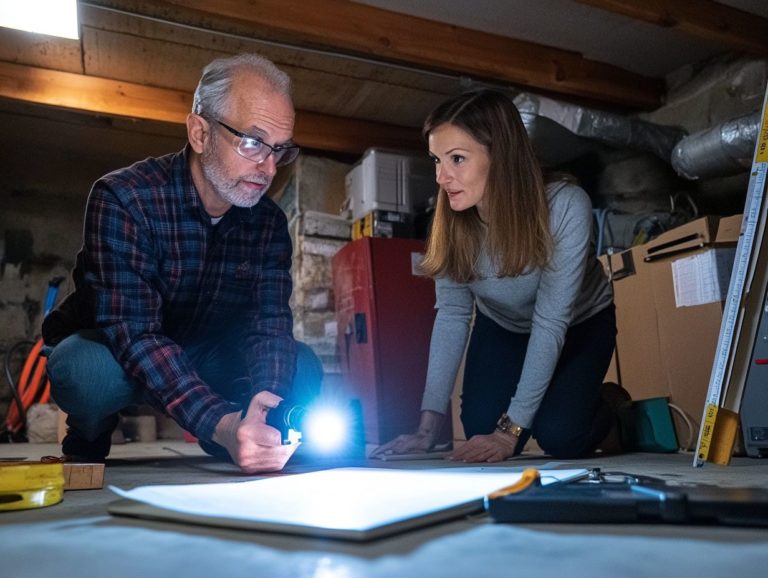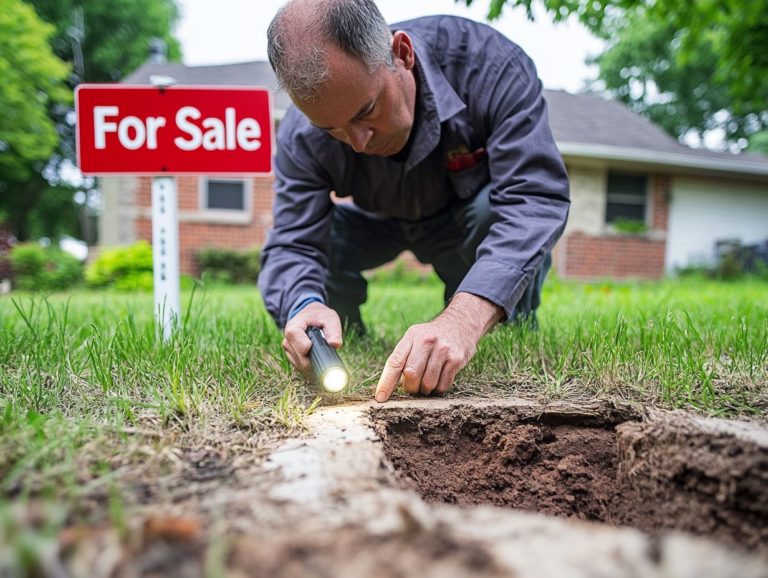Key Questions to Ask Your Home Inspector
Hiring a home inspector is a pivotal step in your home-buying journey. It empowers you to make well-informed decisions about your investment.
With so much on the line, it’s vital to ask the right questions.
This article equips you with essential inquiries to elevate your discussions with potential inspectors.
From their qualifications to their inspection methods and the common issues they encounter, understanding these details will help you select the ideal professional for your needs.
Uncover what you need to know before making this significant choice.
Contents
- Key Takeaways:
- 1. What is Your Experience and Qualifications?
- 2. What Is Included in the Inspection?
- 3. How Long Will the Inspection Take?
- 4. Can I Attend the Inspection?
- 5. How Will You Report Your Findings?
- 6. What Are the Most Common Issues You Find in Homes?
- 8. Do You Have Any Specialties or Areas of Expertise?
- 9. How Do You Stay Up-to-Date on Industry Changes?
- 10. What Is Your Availability for Follow-Up Questions?
- 11. Can You Provide an Estimated Cost for Repairs?
- 12. Are There Any Areas of the Home That You Cannot Inspect?
- 13. Do You Have Insurance?
- 14. Can You Explain the Importance of Each Component You Inspect?
- 15. What Sets You Apart from Other Home Inspectors?
- Frequently Asked Questions
- What qualifications should I look for in a home inspector?
- What are some key questions to ask a potential home inspector?
- What should be included in a home inspection report?
- How long does a home inspection typically take?
- Can I attend the home inspection?
- What if issues are found during the home inspection?
Key Takeaways:

- Choose a home inspector with experience and proper qualifications.
- Ensure the inspection includes all necessary components and potential issues.
- Ask about the duration, attendance, and reporting process of the inspection.
1. What is Your Experience and Qualifications?
When you re looking for a qualified home inspector, grasping their experience and qualifications is crucial. This understanding ensures you receive a thorough check of the property’s condition, whether you re buying or selling.
A seasoned inspector typically has certifications from organizations like the International Association of Certified Home Inspectors (InterNACHI) or the American Society of Home Inspectors (ASHI).
With years of hands-on experience, these professionals often undergo specialized training covering important areas like plumbing systems, electrical frameworks, and mold detection.
This depth of expertise results in detailed inspection reports that not only highlight existing issues but also forecast potential future concerns. Armed with this information, you can make informed decisions about your property investments and navigate the market with confidence.
2. What Is Included in the Inspection?
A comprehensive home inspection offers a detailed evaluation of various home systems, safety hazards, and structural issues. This provides invaluable insights into the property’s condition, whether you’re buying or selling.
This thorough assessment typically covers several essential areas:
- Examine the integrity of the roof and check the shingles for wear and tear.
- A careful evaluation of the HVAC system, which keeps the home’s climate comfortable.
- The plumbing will be checked for leaks or outdated components.
- The electrical system will be assessed to ensure it meets safety standards.
- Pay attention to the effectiveness of insulation, vital for energy efficiency.
- Look for signs of potential pest infestations, which could signal deeper issues.
The inspection report is a crucial tool in your arsenal. It assists you in negotiating repair costs and fosters a clear understanding of the property s overall health.
3. How Long Will the Inspection Take?
The duration of a home inspection usually spans from two to four hours. This depends on the size and complexity of the property, as well as the thoroughness of the inspection process.
Larger homes or those with extensive additions tend to require more time. Inspectors need to account for multiple rooms and systems throughout the property. Older properties often present unique challenges that demand additional time for checks on aging roofs or outdated plumbing and electrical systems.
To ensure a smooth inspection day, prepare the property by making it easily accessible. Clear pathways, provide easy access to attics or basements, and have utilities turned on. This enhances the inspector’s efficiency.
Preparation not only minimizes delays but also contributes to a comprehensive evaluation. This allows everyone involved to gain a clearer understanding of the property’s quirks and strengths.
4. Can I Attend the Inspection?
As a home buyer or seller, you are often encouraged to attend the inspection. This is a great chance for you to gain firsthand insights from the home inspector regarding the property’s condition and any potential issues that may arise.
Being present allows you to ask questions directly related to safety hazards, such as electrical concerns or plumbing issues, and receive precise recommendations on necessary maintenance. This interactive experience deepens your understanding of the findings, helping you make better decisions about future repairs and negotiations.
Having multiple parties present can distract the inspector. Emotional reactions to findings can cloud your judgment, so striving to remain objective during this crucial discussion is beneficial.
5. How Will You Report Your Findings?

The inspection report serves as an essential document that captures the findings of a comprehensive inspection. It highlights any repair recommendations and provides cost estimates for necessary fixes, ensuring that both buyers and sellers are well-informed.
In a typical report, you ll encounter sections dedicated to major systems like roofing, plumbing, electrical, and HVAC. Each section offers a detailed analysis, noting both functional elements and potential concerns.
With clear language and straightforward descriptions, the report makes the complexities of the inspections easily digestible. Clear reports build trust, enabling home buyers to make informed decisions while aiding sellers in proactively addressing issues. Ultimately, clear reports make the buying and selling process smoother and less stressful.
6. What Are the Most Common Issues You Find in Homes?
During home inspections, you ll often encounter several common issues that can affect your property s overall value. These include plumbing problems, electrical system malfunctions, foundation concerns, mold issues, and various safety hazards.
For example, outdated plumbing could lead to leaks, resulting in water damage and creating a breeding ground for mold a serious red flag for many buyers. Likewise, if your electrical system is on the fritz, you could be looking at safety risks, including potential fire hazards, which can shake buyer confidence.
Foundation problems can be especially concerning, as they often hint at deeper structural issues that come with hefty repair costs. Addressing these issues before putting your home on the market can boost its appeal and significantly enhance its value, paving the way for a smoother transaction for everyone involved.
8. Do You Have Any Specialties or Areas of Expertise?
Many home inspectors have their own specialties or areas of expertise think mold testing, pest inspections, or a deep understanding of specific construction practices. This enhances their ability to deliver comprehensive inspection services.
These specialized skills can be a game-changer for both buyers and sellers during the property inspection process. For example, an inspector with a knack for electrical systems can spot potential hazards that might fly under the radar for the average person, ensuring safety and compliance with codes.
Likewise, inspectors well-versed in foundation stability can evaluate structural integrity, empowering buyers to make informed decisions about their long-term investment value.
If you encounter HVAC specialists, they ll provide insights into heating and cooling efficiency, which could influence negotiations based on anticipated repair costs. By tapping into these various specialties, both buyers and sellers can navigate the complexities of property transactions with greater confidence.
Don’t wait! Schedule your home inspection today for peace of mind and better negotiations.
9. How Do You Stay Up-to-Date on Industry Changes?
Staying up-to-date on industry changes is crucial for you as a home inspector. Engaging in continuing education and conducting market research are key ways to remain informed about new construction practices and inspection standards.
You often find yourself attending workshops and seminars, immersing yourself in the latest technologies and techniques in home inspections.
By participating in professional associations, you gain valuable networking opportunities with peers, fostering an environment for knowledge exchange. Subscribing to industry publications keeps you in the loop on emerging trends and regulations.
All these efforts not only enhance your skill set but also ensure that your clients receive accurate and reliable assessments. Ultimately, this dedication contributes to safer and more informed real estate transactions.
10. What Is Your Availability for Follow-Up Questions?
An accessible home inspector should always be at your disposal for follow-up questions after the inspection. This allows you, whether you’re a home buyer or seller, to seek expert advice regarding your inspection report and address any concerns that may arise. For more insights, check out what to expect with a home inspection.
Ongoing communication is vital; it not only reinforces the inspector’s findings but also sheds light on any complex issues that might warrant further discussion. You may find yourself with lingering questions about specific repairs or maintenance recommendations highlighted in the report.
To streamline this communication, it s wise to compile a list of your most pressing inquiries before reaching out. Don’t hesitate to ask for clarifications on any terms that appear technical or confusing.
By maintaining an open line of dialogue, you enable the inspector to offer tailored advice, ensuring that you feel well-informed and supported throughout your decision-making process.
11. Can You Provide an Estimated Cost for Repairs?

A qualified home inspector often presents estimated repair costs for any issues uncovered during the inspection, giving you whether a buyer or seller a clearer understanding of the potential financial implications on property value and necessary home maintenance.
These estimates come from the inspector s experience and knowledge of local contractors and materials. By evaluating the severity of each issue, inspectors can provide a clear picture of what you might need to invest to restore the property to its prime condition.
This insight is invaluable during negotiations, giving power to both parties to make informed choices about repair requests or price adjustments. These assessments also serve as a roadmap for future maintenance planning by pinpointing critical areas that will need attention.
This ensures you can allocate your budget wisely over time, avoiding unexpected financial surprises down the road.
12. Are There Any Areas of the Home That You Cannot Inspect?
While home inspectors conduct careful inspections, it s important to know that there are certain areas of the home that may not be accessible or fully inspectable, which can limit the overall assessment of the property s features.
For example, inaccessible attics, crawl spaces (which are low areas under the house that can be difficult to access), or areas obscured by bulky furniture can present challenges in delivering a comprehensive overview of the home s condition.
In these instances, it s essential for inspectors to transparently communicate these limitations to both the buyer and seller. This practice ensures that everyone involved understands which aspects of the property were not thoroughly assessed, fostering trust and clarity throughout the transaction.
Being candid about these potential shortcomings gives you the power to make informed decisions, highlighting the critical role of thorough communication in the home inspection process.
13. Do You Have Insurance?
Professional home inspectors carry insurance coverage, including general liability, to protect themselves and their clients from potential claims that might arise from their inspection services. This coverage shields against mishaps during the inspection and addresses unforeseen issues that may emerge afterward, giving everyone involved peace of mind.
When you engage an inspector, you trust that their findings are accurate and reliable. The right types of insurance, like errors and omissions, reinforce that trust, signaling that the inspector operates with a high level of professionalism and responsibility.
This security gives clients peace of mind that their investments are safe, fostering a smoother transaction process while enhancing the credibility of inspection professionals.
14. Can You Explain the Importance of Each Component You Inspect?
Understanding the significance of each component evaluated during a home inspection is essential for both buyers and sellers, as it directly influences the property’s value, safety, and long-term maintenance requirements.
By gaining an understanding of critical elements like the roof, foundation, plumbing, and electrical systems, you can identify potential risks and necessary repairs.
For example, a compromised roof could lead to expensive leaks. Structural issues in the foundation might jeopardize the home’s overall integrity, and outdated plumbing or electrical systems could present serious safety hazards.
Recognizing these factors empowers you to negotiate more favorable terms, prioritize repairs effectively, and budget wisely. This proactive approach ultimately leads to a smoother transaction and a more secure investment in your property.
15. What Sets You Apart from Other Home Inspectors?
When selecting a home inspector, it s crucial to identify what sets them apart from others in the field. Look for unique qualities, specialized expertise, or impressive client referrals that showcase their commitment to excellence in inspection services.
Understanding these unique selling propositions can significantly enhance your decision-making process. For example, an inspector with specialized training in energy efficiency can offer insights that lead to long-term savings for you as a homeowner.
Their dedication to outstanding customer service, highlighted by glowing reviews, ensures a transparent and reassuring experience for both buyers and sellers. Innovative inspection techniques, such as thermal imaging and drone inspections, can reveal hidden issues that traditional methods might overlook, ultimately providing you with peace of mind.
These differentiating factors enrich the inspection process and foster trust and confidence in the property’s condition.
Frequently Asked Questions

What qualifications should I look for in a home inspector?
When hiring a home inspector, look for someone who is licensed and certified. Ensure they are experienced and have a good reputation in the industry.
What are some key questions to ask a potential home inspector?
Some important questions to ask include: What is your background and experience? What is your process for inspecting a home? Can I see a sample report? Additionally, refer to the top 10 questions to ask your real estate agent regarding your availability for scheduling an inspection.
What should be included in a home inspection report?
A thorough home inspection report should include details about the condition of the structure, interior and exterior of the home, and any major systems such as plumbing, heating, and electrical. It should also highlight any potential issues or safety hazards identified during the inspection.
How long does a home inspection typically take?
The duration of a home inspection can vary depending on the size and condition of the home. On average, a typical home inspection takes 2-4 hours. However, larger or more complex homes may take longer.
Can I attend the home inspection?
Yes, it is highly recommended that you attend the home inspection. This allows you to ask questions and address any concerns in person. It also gives you the opportunity to see any issues firsthand and fully understand the inspector’s findings.
Reach out today for a thorough home inspection that gives you confidence in your investment!
What if issues are found during the home inspection?
If issues are found during the home inspection, the inspector will provide a written report detailing the findings. It’s important to review this report carefully and discuss any concerns with the inspector, especially regarding what to expect during a home inspection.
The severity of the issues can impact your negotiations with the seller. You may be able to ask them to fix these problems before you finalize the purchase of your new home!






